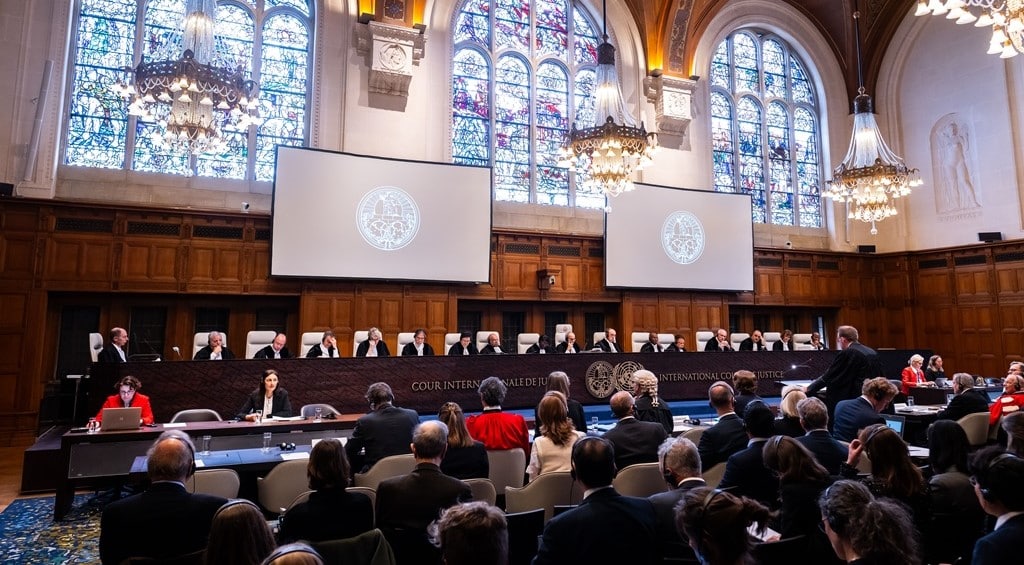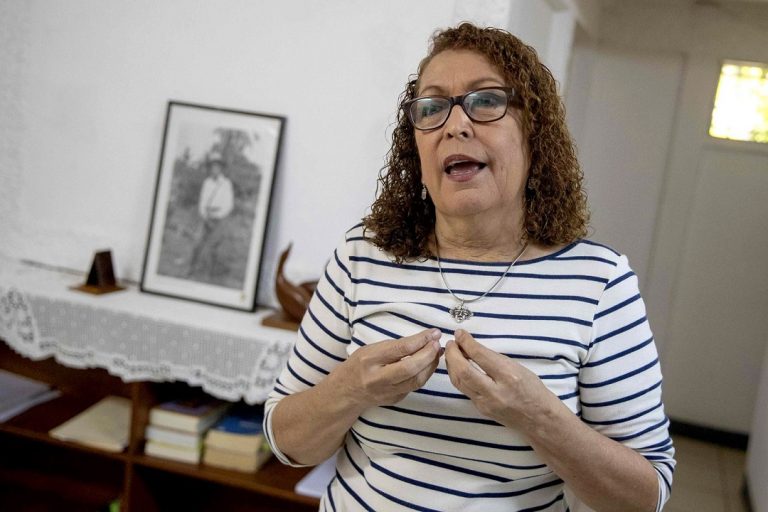18 de julio 2023

ICJ Rules Against Nicaragua's Request For Germany to Halt Arms Sales to Israel

PUBLICIDAD 1M
PUBLICIDAD 4D
PUBLICIDAD 5D
In August 2021, Baltodano left Nicaragua together with her family to protect their safety, denouncing “harassment and persecution”

Former guerrilla Mónica Baltodano, denationalized by the Ortega regime. Photo: EFE
The fall of the Somoza family dictatorship occupies a place in the memory of Sandinista comandante Monica Baltodano, a former guerilla and former deputy who at 69 years old was stripped of her nationality by Daniel Ortega's regime, last February 15. She keeps some personal photographs of that historic event, which will be 44 years ago on July 19, 2023.
Baltodano spoke to CONFIDENCIAL on the occasion of the anniversary of the Sandinista revolution. She considers that the persecution against the Catholic Church, the direct repression of the FSLN, and the generalized corruption in the country explain the drop in the population's sympathy towards the ruling party, registered at 13% in the June 2023 survey of CID Gallup, sponsored by CONFIDENCIAL.
In August 2021, Baltodano left Nicaragua together with her family to protect their safety, denouncing “harassment and persecution,” after having lived in hiding for months. From Costa Rica, she has denounced the human rights abuses of Ortega, her former comrade in arms.
She joined the struggle against Somoza in 1969 when she was 15 years old. She was part of the young people who belonged to the Christian movement that participated in the strikes for teachers' rights, freedom for political prisoners and joined in 1972 the former Sandinista National Liberation Front (Frente Sandinista de Liberación Nacional). She fell prisoner in 1977-78 and went on to lead this party's structures in the Prolonged People's War (GPP) faction in Managua.
What explains the FSLN's drop in the recent CID Gallup poll to only 13% of approval ratings?
The repressive actions of the regime have affected sectors of the Sandinista base. An important part of that base is Catholic. They cannot be in favor of the brutalities committed against priests in their parishes, the freezing of their accounts, banishment, and imprisonment. Let alone the cruel action against Bishop Rolando Alvarez.
They are not in favor of the closing of thousands of organizations where part of that traditional Sandinista base also worked, or of organizations that offered programs helping abused women, children at risk, cooperatives, and environmental activists. It is necessary to multiply these 3400 organizations by the beneficiaries in the most remote places of Nicaragua. A large part of them were also part of the Sandinista base.
But there is also direct repression. They cannot be in agreement with not being allowed to leave the country (it is known that the main state officials cannot leave without special permits), and they do not agree with being repressed for not obeying the political secretaries. An important part of the rank and file resents the lack of freedom, they also feel suffocated by the subjection to certain people they do not respect. For example, the continuous reelection of the same deputies, the same councilmen, the same mayors, of the same chiefs in the military institutions, has eroded cohesion.
The Sandinista base is also a victim of widespread corruption. The brutal charges of IBI (Real Estate Tax) being made by some municipalities, high taxes on merchants. The arbitrary police fines. And of course, the majority of this base is also poor people who are suffering from inflation, the high cost of living, the layoffs in the Free Trade Zone, and the general deterioration of the economy.
We have reports of FSLN rallies that are empty during the July events, with no participation of historical figures and with a lot of migration. What characterizes these FSLN celebrations today?
In Nicaragua, fear, the most primitive of emotions, reigns. Not even those who are close to power are free of it because the closer they are, the more fear there is of thinking and acting with autonomy. Any follower or official can be labeled as a suspect of treason. Counterintelligence is everywhere and it neither sleeps nor forgives.
What is the best way to express oneself in a society where fear reigns? Absence. That explains the abstention in the electoral masquerades. Those who cannot afford this luxury are part of the controlled workers of the State. But that is only a small part of the base. So, they simply decide not to participate. The regime has always taken advantage of the events of the '79 revolution to move a part of that base, but that base is now older (and) can no longer mobilize. The celebrations are progressively characterized by the participation of those directly dependent. Last year it was common to see dozens of policemen in these increasingly shrinking marches.
How do Ortega's dynastic aspirations collide with this reality? What is the situation of Vice President Murillo and her son Laureano in the face of the unpopularity reflected in the polling data?
The survey results show that the rejection of Murillo and Laureano is enormous. It is very difficult to overcome that rejection. Therefore, this is an Achilles heel for Ortega in his dynastic aspirations. Let us not be surprised if they decide to launch Laureano as mayor of Managua, as part of the preparations for the succession. They must not like the fact that Reyna Rueda (current mayor) comes out better ranked than the members of the family.
What is the FSLN today compared to its history, and how much does it owe its image to Ortega?
Carlos Fonseca's FSLN as a force with transformative proposals ceased to exist more than 30 years ago. Later, as a political party with democratic bodies and primaries, it had a very short life. The FSLN today is a machine at the service of the dictatorial couple. And it has only one purpose: the control of power to enjoy privileges for the family and a reduced group of loyalists. But we cannot forget that Ortega expanded the spaces of power, starting with the pact with (former President Arnoldo Alemán) and the PLC and with Cardinal (Miguel) Obando, who through his "protégé" Roberto Rivas favored Ortega's control over the CSE.
For an important sector of society, the FSLN today is a repressive force in neighborhoods and communities, from whose ranks came the paramilitaries who fired on the population that was protesting.
Do you view today's FSLN with frustration?
My feeling towards the FSLN is of total distancing, emotionally and rationally. I could not use the word frustration. I believe that the role it played against the Somoza dictatorship is indelible in history and that the sacrifice of so many young people who died under the umbrella of those acronyms will not be erased from memory. Later, history itself will explain its mutation from an anti-dictatorial revolutionary force into a repressive and dictatorial force. It is not the first time this has happened in the history of people's struggles.
What place do you think Ortega and Murillo will occupy in history?
Ortega will go down in history as someone who in his youth had revolutionary ideas, but at one point in his life began a process that ended up turning him into a monster, oppressor, and criminal. The denunciation of Zoilamérica (Ortega Murillo) indicates that Ortega began to abuse her in 1978. This means that while the entire Nicaraguan people were part of the struggle, he committed these barbarities. Historical information will make it possible to clearly see their trajectory, their drift, and their obsession for power, shared with Rosario (Murillo), which leads them to be the antithesis of what they preach in their lying discourse. They will pass as cruel dictators, and abusers, responsible for crimes that offend humanity.
As you mentioned about Zoilamérica, there will be people who will bring up a picture of you together with Ortega in those days. Have you ever made a statement about that?
Yes, I have said that when Zoilamérica made that accusation, I did not believe it at the time. That I preferred to subordinate myself to the party discipline I had learned for years, and that Ortega told me that this accusation was a lie and expressly asked me to come to that conference. That months later I refused to run for the National Directorate (DN) and one of the reasons was that accusation. I have publicly apologized to Zoilamérica for not having believed her. She posted about this issue on her Facebook several years ago and that, since then, I have had friendly communication with her.
Most of the people who take advantage of this photo do so not because they are in solidarity or have ever been in solidarity with Zoilamérica, but because it favors their campaigns against those of us who come from Sandinismo.
This article was originally published in Spanish in Confidencial and translated by our staff.
PUBLICIDAD 3M
Periodista nicaragüense, exiliado. Comenzó su carrera en el año 2000, cuando todavía era estudiante. Por sus destacadas investigaciones periodísticas ha ganado el Premio Ortega y Gasset, el Premio Internacional de Periodismo Rey de España, el Premio a la Excelencia de la Sociedad Interamericana de Prensa, y el Premio Latinoamericano de Periodismo de Investigación del Instituto Prensa y Sociedad (IPYS).
PUBLICIDAD 3D